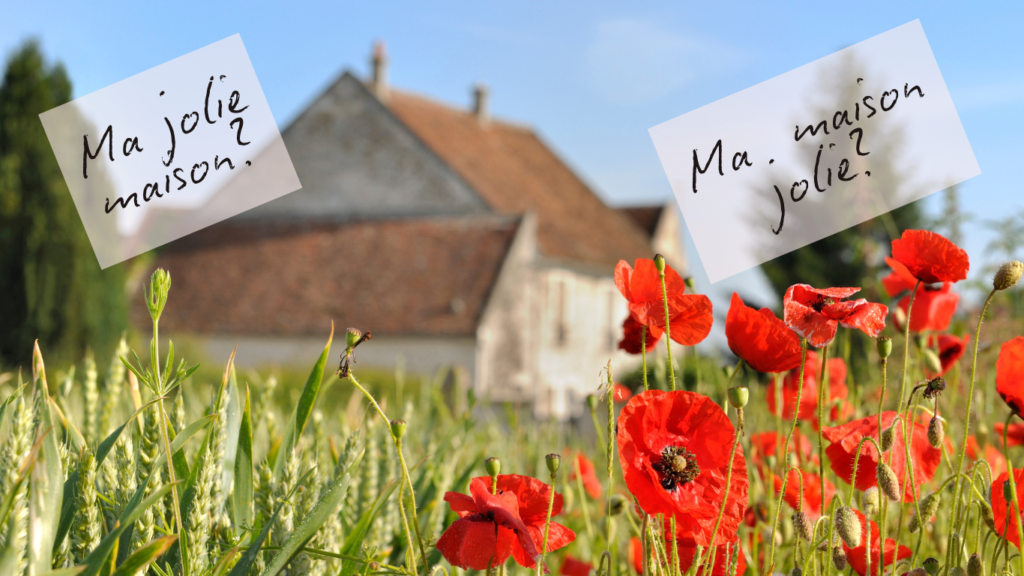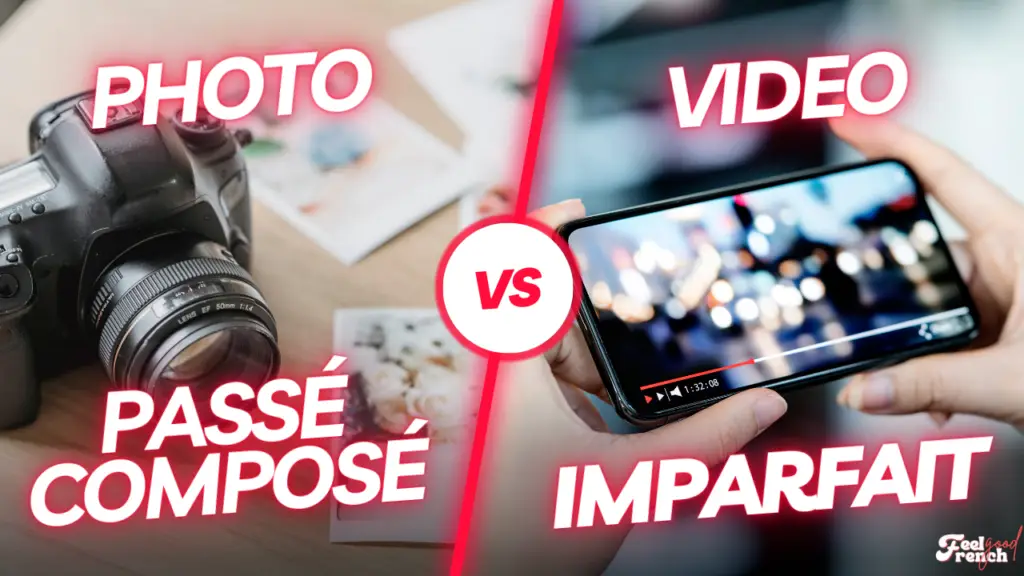Learning to place adjectives correctly in French sentences can be one of the most confusing aspects of learning the language—especially if you’re an English speaker. You might have memorized the rule that adjectives generally go after the noun in French, but then you hear phrases like “une belle maison” or “un grand hôtel” and wonder why it doesn’t follow the pattern.
The truth is that French adjective placement has some clear patterns, a few frustrating exceptions, and a whole lot of room for confusion. If you’ve ever found yourself hesitating mid-sentence, wondering where to put the adjective, you’re not alone. This article will walk you through the key rules, the most common exceptions, and how to naturally improve your use of adjectives through exposure and practice.
Whether you’re describing a charming café in Paris, a peaceful village in the Dordogne, or a sunny terrace on the French Riviera, this guide will help you place adjectives naturally and confidently in French sentences.
Why French Adjectives Usually Go After the Noun
One of the first things you learn about French adjectives is that they typically come after the noun—unlike in English, where adjectives come before the noun.
Examples:
- J’ai loué une maison magnifique en Dordogne. → “I rented a magnificent house in the Dordogne.”
- Il a trouvé une plage tranquille sur la Côte d’Azur. → “He found a quiet beach on the French Riviera.”
- Nous achetons une bouteille de vin rouge. → “We are buying a bottle of red wine.”
- Elle a visité une cathédrale impressionnante à Paris. → “She visited an impressive cathedral in Paris.”
This is the default rule in French: most adjectives follow the noun they describe. This is why you’ll hear native speakers say “une voiture rouge” (a red car) and not “une rouge voiture.”
But Some Adjectives Go Before the Noun (Think BRAGS)
Here’s where things get tricky: certain adjectives, especially those describing Beauty, Rank, Age, Goodness, and Size (BRAGS), go before the noun.

Adjectives that typically go before the noun:
- Beauty – beau (beautiful), joli (pretty)
- Rank – premier (first), dernier (last), prochain (next)
- Age – jeune (young), vieux (old), nouveau (new)
- Goodness – bon (good), mauvais (bad), meilleur (better)
- Size – grand (big), petit (small), gros (fat), long (long)
Examples:
- Une belle vue sur la mer → “A beautiful view of the sea.”
- Un vieux village en Provence → “An old village in Provence.”
- Un bon restaurant à Paris → “A good restaurant in Paris.”
- Un petit marché local dans le Luberon → “A small local market in the Luberon.”
- Le premier bateau à arriver au port → “The first boat to arrive at the port.”
If the adjective fits into one of these BRAGS categories, it likely goes before the noun.
Adjectives That Change Meaning Depending on Placement
Some adjectives change their meaning depending on whether they are placed before or after the noun. This is one of the most challenging aspects of adjective placement for learners.
Here are the most common examples:
| Adjective | Meaning Before the Noun | Meaning After the Noun | Example |
|---|---|---|---|
| Ancien | Former | Old | Mon ancien appartement à Nice = My former apartment in Nice Un bâtiment ancien à Paris = An old building in Paris |
| Cher | Dear (emotionally) | Expensive | Un cher ami = A dear friend Un vin cher = An expensive wine |
| Dernier | Last (final) | Last (preceding) | La dernière semaine de l’année = The final week of the year La semaine dernière = Last week |
| Grand | Great | Tall | Un grand homme = A great man Un homme grand = A tall man |
| Pauvre | Unfortunate | Poor (financially) | Un pauvre homme = An unfortunate man Un homme pauvre = A poor man |
| Prochain | Next (in a sequence) | Next (upcoming) | Le prochain train = The next train in a sequence La semaine prochaine = Next week |
| Seul | Only | Lonely | La seule femme ici = The only woman here Une femme seule = A lonely woman |
Examples:
- Mon ancien appartement à Bordeaux était petit mais charmant. → “My former apartment in Bordeaux was small but charming.”
- Il a commandé un vin cher dans un restaurant à Nice. → “He ordered an expensive wine in a restaurant in Nice.”
- C’est un grand homme. → “He’s a great man.”
- Il est devenu un homme grand. → “He became a tall man.”
When the adjective is before the noun, it often reflects a more abstract or subjective quality. When it’s after the noun, it tends to reflect a more literal or concrete meaning.
How to Get Better at French Adjective Placement

The best way to master adjective order in French isn’t through memorization—it’s through exposure and practice. You’ve probably noticed that after hearing certain phrases enough times, they start to feel “right.” That’s because your brain begins to internalize the pattern.
1. Listen to Native French Speakers
- Watch French movies and TV shows (Call My Agent, Amélie, Lupin) and pay attention to how adjectives are used.
- Listen to French podcasts and repeat the sentences you hear.
- If you’re living in France, listen to how locals naturally structure their sentences.
2. Read Authentic French Texts
Reading helps reinforce patterns. Start with easy French books, articles, or even menus. Notice where adjectives are placed. Here are five French websites where learners can read authentic content and observe adjective placement naturally:
- Le Monde – For clear, high-quality news articles.
- Le Parisien – For everyday language and conversational writing.
- Marmiton – For recipes filled with descriptive adjectives.
- Geo – For rich travel stories and cultural insights.
- 1jour1actu – For simplified news, perfect for learners.
By regularly reading these, learners can naturally absorb adjective placement patterns in real-life contexts.
Examples of sentences from daily life in France:
- Un petit café en terrasse à Paris → “A small coffee on a terrace in Paris.”
- Une jolie maison en Dordogne → “A pretty house in the Dordogne.”
- Un grand marché provençal → “A big Provençal market.”
3. Stop Projecting English Sentence Structure
English has a fixed adjective order. French is more flexible—but that’s part of the charm. Don’t try to force French adjectives to behave like English ones. Let go of the instinct to translate word for word.
4. Practice with Repetition
Set aside time to practice writing and speaking French sentences. Try describing your daily life:
- What kind of apartment do you have? Quel type d’appartement vous avez?
- How would you describe your favorite café? Comment décrire votre café préféré?
- How would you compliment someone’s house or garden? Comment complimenter la maison ou le jardin d’un ami?
Examples:
- J’habite dans un petit appartement au centre ville de Nantes.
- J’adore ce petit restaurant de quartier à Bordeaux.
- Il a une belle vue sur la mer.
- Nous avons trouvé un vieux marché dans le Luberon.
5. Immerse Yourself in French Life
If you’re living in France or planning to visit, use French in daily life. Compliment someone on their outfit, order food in a restaurant, or ask for directions. The more you practice, the more natural adjective placement will feel.
Sign Up for the Feel Good French Newsletter
Common Pitfalls to Avoid
To make things easier, here’s what NOT to do:
- Don’t assume all adjectives follow the same rule.
- Don’t forget that adjective placement can change meaning.
- Don’t try to force direct translations from English—it won’t work.
Exercise 1: Complete the Sentence

Place the adjective in the correct position by filling in the blanks before or after the noun.
- J’ai acheté un _______ panier _______ en osier. (beau)
- Nous avons trouvé un _______ appartement _______ avec une vue sur la mer. (spacieux)
- Il a commandé une _______ tarte _______ aux fraises. (délicieux)
- Elle a visité une _______ cathédrale _______ à Paris. (ancien)
- Nous avons loué un _______ hôtel _______ dans le centre-ville. (petit)
- C’est une _______ histoire _______ qu’elle m’a racontée. (intéressant)
- Il a acheté une _______ voiture _______. (nouveau)
- Il a rencontré un _______ homme _______. (grand)
- J’ai trouvé une _______ maison _______ dans un village provençal. (charmant)
- Elle a bu un _______ vin _______ lors du dîner. (cher)
Exercise 2: Complete the Sentence
Place the adjective in the correct position before or after the noun.
- Il a loué un _______ appartement _______ dans le centre de Bordeaux. (grand)
- Nous avons commandé une _______ salade _______ au restaurant du coin. (frais)
- Elle a acheté une _______ maison _______ avec une vue magnifique. (nouveau)
- J’ai goûté un _______ fromage _______ du marché. (délicieux)
- Il a choisi un _______ hôtel _______ près de la plage. (confortable)
- Ils ont trouvé une _______ solution _______ à leur problème. (simple)
- C’était une _______ journée _______ passée au bord de la mer. (long)
- Nous avons visité une _______ ville _______ en Provence. (ancien)
- Il a rencontré une _______ femme _______ lors de la soirée. (joli)
- Nous avons dégusté un _______ vin _______ lors de notre visite dans le Bordelais. (bon)
Exercise 3: Put the Words in the Right Order
Rearrange the following words to form a grammatically correct sentence with the correct adjective placement. The order of the elements is mixed to make it more challenging.
- trouvé / hôtel / charmant / petit / j’ai / un
- robe / une / bleue / porte / elle / élégante
- nous / jolie / maison / acheté / avons / ancienne / une
- cher / il / commandé / repas / un / a
- ont / délicieux / rouge / dégusté / un / vin / ils
- rencontré / ai / ami / vieux / un / j’
- vue / elle / magnifique / une / a / sur la mer
- quartier / calme / petit / nous / un / avons / trouvé
- ont / opportunité / découvert / une / intéressante / ils
- gâteau / au chocolat / petit / a / elle / commandé / un
Mot de la fin: Open a New Door to French Fluency
Mastering adjective placement in French sentences is not about perfection… It’s about practice and exposure. Read more. Listen more. Speak more. The patterns will start to feel natural over time. If you want to go further and learn about French prepositions, check this other post I wrote about À, En, Au, and Aux.
When you stop trying to fit French into an English mold, you’ll start to hear the language differently. Adjective order will no longer feel like a puzzle. It will become second nature. And when that happens, you’ll find yourself speaking more confidently and naturally in French. Petit à petit. Little by little.
Petit à petit, l’oiseau fait son nid – Little by little the bird makes its nest
Popular French Saying

Why “-ent” Is Silent in French Verbs (and Why That Matters)
If you’re an expat learning French, you’ve probably seen verbs ending in -ent and wondered…
How to Say “To Go” in French | Aller Verb Conjugation
The verb aller (to go) is one of the most essential and frequently used verbs…
French Sentences: Why You’re Getting Adjective Order Wrong (And How to Fix It)
Learning to place adjectives correctly in French sentences can be one of the most confusing…
Think You Know French Prepositions? À, En, Au, and Aux Might Surprise You!
“Je vais à Nice, en France, au marché… et aux urgences?” French prepositions of place…
How to Use French Question Words Correctly (Without Sounding Awkward!)
Asking questions in French can feel tricky, especially because there are several different ways to…
French Past Tense – Imparfait vs Passé Composé: No More Confusion
“Hier, j’ai vu un film au cinéma.” → A specific event, completed action → passé…






